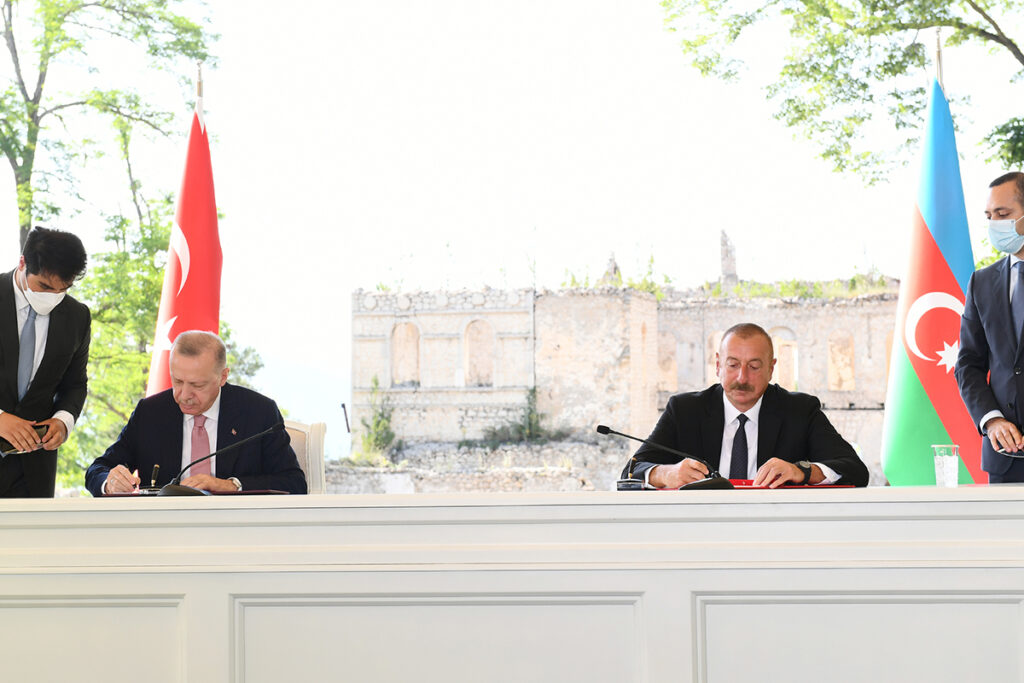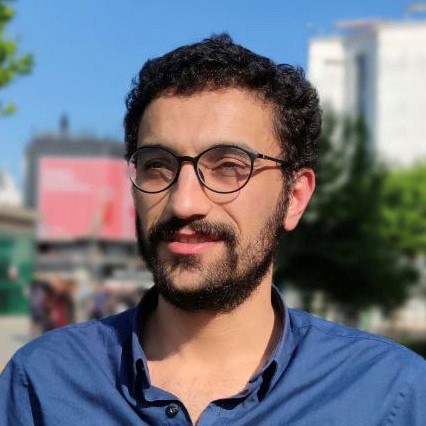The ‘Shusha Declaration’, on its surface, is a wide ranging cooperation agreement between Azerbaijan and Turkey including mutual defence guarantees. But what, if any, are the implications of the agreement for the South Caucasus and beyond?
At a ceremony in Shusha (Shushi) on 15 June, Azerbaijani President Ilham Aliyev and Turkish President Recep Tayyip Erdogan signed the ‘Shusha Declaration’.
The document, among other things, stated that an attack on either country would be considered an attack on both. The declaration also discusses cooperation in the international arena, as well as political, economic, trade, cultural, educational, sports, youth, energy security, and military cooperation.
In addition, the Turkish President announced that Turkey would open a consulate in Shusha.
‘The name of our cooperation is alliance — and that says it all’, Aliyev said in a statement.
Erdogan and his wife were welcomed by Aliyev, and his wife Mehriban Aliyeva, in the Fizuli region before they moved on to Shusha, all areas over which Azerbaijan gained control after the Second Nagorno-Karabakh War.
It came a day after the Turkish leader met with US President Joe Biden at a NATO summit in Brussels.
Erdogan last visited Azerbaijan in December 2020 when he attended the victory parade that followed the 44-day war.
‘Azerbaijan no longer pursues a balanced policy with the West, but between Turkey and Russia’
Azer Gasimli, a political analyst, told OC Media that the declaration illustrated a shift in Azerbaijan’s geopolitical priorities.
‘Before the war, Azerbaijan was managing its political balance between Russia and the West in the South Caucasus region.’
‘On 10 November 2020, the agreement signed between Azerbaijan, Russia, and Armenia, which included the entry of Russian peacekeepers into Nagorno-Karabakh, was clear proof of one side of this balance. The other side of the balanced policy is indicated by the Shusha Declaration.’
‘Thus, Azerbaijan no longer pursues a balanced policy with the West, but between Turkey and Russia.’
Commenting on the opening of a Turkish Consulate in Shusha and the mutual economic relations contained in the declaration, Gasimli said that all this was done without consulting Russia.
‘Turkey openly states that it wants to open a Consulate General in Shusha, which is the territory of Azerbaijan. If any pressure on Shusha or any status issue related to Nagorno-Karabakh is raised, the city of Shusha will not be the subject of these discussions’, Gasimli added.
‘Turkey claims to be the guarantor of Shusha. By opening a consulate, a kind of Turkish flag is planted there.’
Gasimli cast doubt on the significance of the economic aspects of the declaration.
‘In general, despite the economic clauses of this declaration, the Azerbaijani government will not allow Turkey to have a say in the Azerbaijani market. The economy and current monopolies will remain closed. Several designated Turkish companies will be allowed to operate here.’
Gasimli also said that such steps would not lead to any democratisation or improvement of human rights in the region.
‘I think that all this is another step towards the continuation of authoritarianism in the South Caucasus. If it were not so, if they [Russia] wanted real peace, they would not have created problems in South Ossetia, Abkhazia, Nagorno-Karabakh. The fate of the conflict would be left to the discretion of the states [of the region].’
Zardusht Alizade, a political analyst and former opposition politician, argues that the declaration is nothing more than a renewal of past agreements signed between Turkey and Azerbaijan.
‘The Shusha Declaration does not mean anything special for the region’, Alizade told OC Media. ‘Only the Republic of Turkey, which has the West behind it, openly states that they will act resolutely in defence of Azerbaijan’s position. There is nothing new in the declaration.’
‘The clauses in this declaration are reflected in the agreements and treaties previously concluded between Azerbaijan and Turkey. Turkey is just sending a direct message that “I am with Azerbaijan”.’
‘Turkey's direct support also means that the West’s sympathy for Azerbaijan’s security. There is nothing in the Shusha Declaration against Russia’s interests. Therefore, this declaration has nothing to do with Russia.’
Commenting on the opening of the Consulate General in Shusha, Alizadeh said that this would serve Turkish citizens who will be involved in the area for business, work, and residency purposes.
‘The opening of a Consulate in Shusha means that many Turkish citizens and Turkish companies are involved in the operation to rebuild Nagorno-Karabakh, and this consulate will serve them.’
‘Turkish companies in construction, industry, agriculture, and other fields have been brought to the area for the reconstruction. Massively funded projects have been entrusted to Turkish companies. This means that thousands of Turkish citizens will work there and this consulate will be opened for them.’
‘A victory demonstration for the Aliyev government’
Erdogan’s visit to Shusha was condemned by the Armenian Foregin Ministry as an as an ‘outright provocation against regional peace and security’.
Leyla Abdullayeva, Head of the Press service of the Azerbaijani Foreign Ministry, dismissed the criticism,
‘First and foremost, we would like to note that it is not up to the Armenian Foreign Ministry to comment on the visit of the leaders of neighboring countries’, she said.
‘Armenia should act leaning on the real situation, rather than on illusions. The Joint Declaration by the Presidents of Azerbaijan and Turkey in Shusha is aimed at promoting peace and security and new opportunities for cooperation.’
Richard Giragosian, the director of the Regional Studies Center, a Yerevan-based think tank, said that the visit was ‘framed as a victory demonstration for the Aliyev government.’
‘The framing of the visit as a triumph stemmed from the seizure of the city in the waning days of an especially destructive 44-day war for Nagorno Karabakh in 2020’, Giragosian told OC Media.
‘From that perspective, the presidential visit was also a demonstration of the decisive role of Turkey’s unprecedented direct military support for Azerbaijan in that war.’
‘Yet the Shusha Declaration is neither startling, new, nor particularly novel. In fact, given the depth of Turkish military support and investment in its partner Azerbaijan, the agreement is normal, and only reaffirms Turkey’s return of its past role as Azerbaijan’s primary military patron’, he said.
Giragosian suggested that the declaration may have also been aimed at Russia.
He said that Russia had lost its role as the primary arms provider to both Armenia and Azerbaijan, with ‘Turkey’s post-war position as leading military patron [of Azerbaijan] restored.’
‘The Shusha Declaration also represents an important and powerful message, not to Armenia alone, but also to Russia. In fact, as much as the Declaration of mutual assistance and support can be seen as directed against a weaker Armenia, the true significance lies in the geopolitical demonstration of Azerbaijan-Turkish determination to resist any further expansion of influence and projection of power by Russia in the region.’
Giragosian said the Shusha Declaration had ‘little real or direct impact on post-war diplomacy or on the resumption on the peace process’.
‘First, as with any and all such diplomatic agreements and declarations, the real measure of its impact lies in its implementation, and not simply on ambitious, yet vague promises or on sweeping, but undefined pledges’, he said.
‘Second, as Armenia remains with no new diplomatic strategy, and has yet to overcome its own paralysis of policy, the primary impact on the peace process is Armenian weakness and lack of preparedness.’
Additional reporting by Robin Fabbro.
For ease of reading, we choose not to use qualifiers such as ‘de facto’, ‘unrecognised’, or ‘partially recognised’ when discussing institutions or political positions within Abkhazia, Nagorno-Karabakh, and South Ossetia. This does not imply a position on their status.




 24 June 2021
24 June 2021




